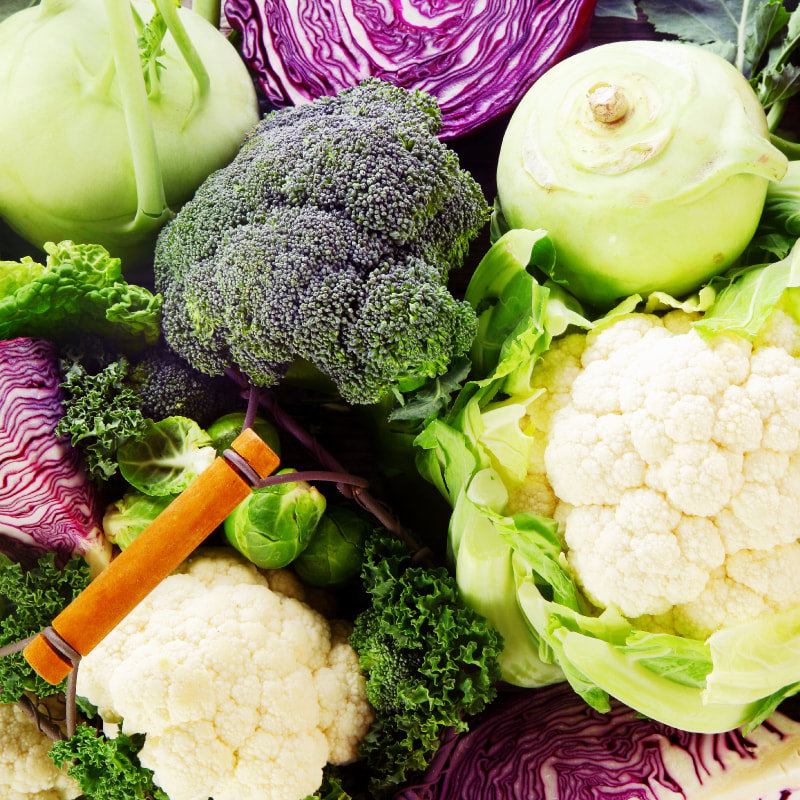|
It was not long time back that I went to a cosy little café to meet my friend over coffee and catch up on all the interesting aspects of life. It was during one of the conversations about daily food habits that I shared my likes and dislikes with her-on my ever-growing love for the snow-white cauliflowers, green broccolis, the multi-layered cabbage and the dark green kale and Brussels sprouts. It was at this point that my friend interrupted and commented that ‘Oh! You love crucifers I guess!’ Though the word sounded strange initially I started coming across frequent usage of the very same word thereon-at the restaurant, in the gym or even in the play area in my apartment when I go down with my kid for some fresh air. Luckily, now is the prime season for most of these cruciferous vegetables that offer a plethora of goodness, refreshment and taste. Let’s look beyond cauliflower and Broccoli and expand our culinary choices to the 40+ vegetables that are consumed all around the world including those famous ones such as Bok choy, collard green, kale, radish, cabbage and mustard greens. Any produce oozes nutritional power and cruciferous vegetables are indeed great for our well-being and health-they have a speciality on their own. What exactly is common among most of these crucifers? It is none other than the four petals that resemble a cross. The name ‘cruciferous’ is an informal classification for members of the mustard family originating from the Latin word Cruciferae meaning ‘cross bearing’. All these veggies belong to a family of plant called as Brassicaceae. Though each of them comes in different colours, shapes and sizes many of them share common benefits. Commonly consumed crucifers such as cabbage, Broccoli, cauliflower, Brussels sprouts and kale are rich sources of vitamins including B6, B2, K, C and folic acid; minerals such as potassium, magnesium and selenium; omega 3’s and soluble fibre. Dark green crucifers are houses to ample vitamins A and C apart from being rich in phytonutrients (compounds that lower inflammation and reduce the risk of developing cancer). Famous for their Infamous Odour Individuals come in all types and have all sorts of preferences. Some are allergic to peanuts and tree nuts; some are lactose intolerant and some others hate few vegetables such as radish and Brussels sprouts that have a pungent smell. The pungent smell emanating from certain vegetables isn’t something inviting and i believe many of you cannot stand the smell of it once you are done cooking the vegetable. Ironically, these veggies don’t emanate any smell even if they are placed right in front of your nose but send out odour only when you chop and cook. Most cruciferous vegetables have a unique smell and bitter flavour that’s due to the breaking down of sulphur-containing phytochemicals called glucosinolates. This break down happens when we cut or cook as there is damage to the cell walls and this damage releases an enzyme that breaks down glucosinolates into biologically active compounds called as isothiocyanates. Research too shows that almost 25% of the world population is genetically sensitive to bitter taste and this makes them repulsive over certain foods that includes crucifers as well. Irrespective of the fact that you love or hate crucifers, the Dietary Guidelines for Americans recommend adults to consume 1.5-2.5 cups of dark-green vegetables every week which includes cruciferous vegetables too. You can indulge in these vegetables by using the tips given below to make the consumption process more pleasant. Roasting the vegetable caramelizes the vegetable making the sweetness more prominent and subsiding the bitter taste. You can even add a pinch of salt to lessen the bitter taste or drizzle some honey over the vegetable to enhance the sweeter taste thereby minimizing the bitterness. (https://chicagohealthonline.com/crunch-on-cruciferous-vegetables/). Why Choose these Vegetables? There have been ample theories that consuming cruciferous vegetables helps fight against cancer. Though studies on lab animals does show protection to the DNA and anti-inflammatory benefits we don’t have conclusive results on human studies. In lab animals eating crucifers has shown to inhibit cancers of the bladder, colon, breast, liver, lung and stomach by inactivating carcinogens, decreasing inflammation and inhibiting formation of tumour cells. Another study on elderly women showed that eating cruciferous vegetables benefited the hearts of the elderly women offering them security against vascular diseases while yet another one was linked to slower cognitive decline.  Hating Crucifers is in the Gene After All! Hating Crucifers is in the Gene After All! Despite its benefits, people with thyroid problems are prescribed to avoid consumption of these crucifers as they contain too high levels of goitrogens (glucosinolates and other chemicals in these veggies) that diminishes the functionality of the thyroid gland by disturbing iodine intake, the result of which is enlargement of the thyroid gland known as goiter (https://indianexpress.com/article/lifestyle/health/diet-diary-food-intolerance-and-thyroid-disorders-directly-proportional/). We also have data suggesting that cooking these vegetables makes them thyroid-safe but their effects become significant when the veggie is consumed in huge quantities. If you are not sure about consuming cruciferous vegetables when you suffer from thyroid problems it is better to restrict their intake to one a week or once a fortnight. For others, whether you love or hate their pungent smell incorporating them in the diet is mandatory for a healthier living. References Science of Flavour: Cruciferous Vegetables: https://www.hsph.harvard.edu/nutritionsource/2016/11/21/science-of-flavor-cruciferous-vegetables-brussels-sprouts/ Do Cruciferous Vegetables Really Fight Cancer? https://www.nytimes.com/2018/12/07/well/eat/do-cruciferous-vegetables-really-fight-cancer.html Eat Your Brussels: https://www.theguardian.com/australia-news/2018/apr/05/eat-your-brussels-scientists-say-vegetable-provides-heart-benefits-to-older-women The Wonderful Healing Power of Cruciferous Vegetables: https://www.theguardian.com/australia-news/2018/apr/05/eat-your-brussels-scientists-say-vegetable-provides-heart-benefits-to-older-women
0 Comments
Leave a Reply. |
AVOID FRAUD. EAT SMART.+91 7846 800 800
AuthorDietitian & Nutritionist Dr. Nafeesa Imteyaz. Archives
July 2024
Categories
All
Dr. Nafeesa's Blog @blogspot |
- Home
- Written Testimonials
- Consult
- Clinics
- Blogs
-
Diet & Nutrition
- Diabetes Reversal
- IVF IUI not needed for PCOS PCOD Infertility
-
Medical Nutrition
>
-
Disease & Conditions
>
- Infertility | PCOS
- Diabetes Mellitus
- Cholesterol
- Hypothyroid
- Kidney Problems
- Hypertension
- Cardiovascular Diseases
- Liver Diseases
- Gastro intestinal disorder
- Cancer
- Metabolic Disorders
- Orthopedic Disorders
- Eating Disorders
- Dietary Recall
- Weight Record Filled By Clients
- Online Payment Transaction Details
- Online Clients Weight Check Form
- Our Program Package Service Charges
- Weight Record 2017 Clients
- Measurements sent by Clients
- Terms & Conditions Of Payment
- Thanks. Your Form is Submitted
- Video Testimonials
- Lifestyle & Wellness
- Lifestyle & Wellness Blog
- Allergy & Intolerance
- Weight Loss / Gain
- Weight Loss / Slimming Blog
-
Disease & Conditions
>
- Life Cycle Nutrition >
- Sports Nutrition >
- Integrity in Nutrition
- Knowledge Centre
© COPYRIGHT 2022. ALL RIGHTS RESERVED. FRST HEALTHCARE PVT LTD.
Dr. Nafeesa Imteyaz of First Eat Right clinic, is the Best Dietitian Nutritionist in Bangalore. Best Dietitian Nutritionist in Pune. Best Dietitian Nutritionist in Hyderabad. Best Dietitian Nutritionist in Chennai. Best Dietitian Nutritionist in Mumbai. Best Dietitian Nutritionist in Delhi. Best Dietitian Nutritionist in Kolkata.


